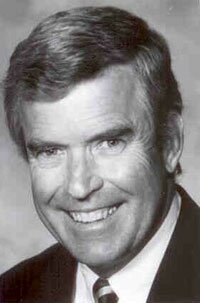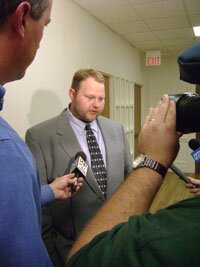COVER- Person of the Year: Gary O'Connell- The CEO of Charlottesville

Gary O'Connell
PHOTO BY JEN FARIELLO
Editor's note: This is our first-ever "Person of the Year" cover story. Our criterion is very similar to that of Time magazine's Person of the Year: the Hook editorial staff singles out the man or woman who most influenced the big news stories in Charlottesville for the year. We feel confident in our pick, but there were many runners-up we considered [see sidebar]. If we've left someone out, let us know with an e-mail to [email protected].
He's the CEO of one of Central Virginia's biggest companies, administering a $162 million annual budget and supervising over 900 employees. Like any CEO, he has a board that stakes out policy positions, but he's the one who makes things happen. Those facts in and of themselves are enough to make Gary O'Connell a contender for "Person of the Year" any year.
However, this year, perhaps more than any other in his 14-year tenure as Charlottesville City Manager, has found O'Connell at the center of several larger-than-usual controversies.
In March, there was the revelation that, despite mounting evidence of dissent, he dissuaded City Council from exploring the option of dredging the South Fork Rivanna Reservoir instead of building a new dam and pipeline.
"A solid majority of our citizens support this solution," he said in one email. "Full steam ahead," he said in another.
Also this spring O'Connell advocated a master plan for McIntire Park that would put a new YMCA on the site where 2,000 amateur athletes play on 160 teams in the City-sponsored adult softball league. With Albemarle County looking increasingly unlikely to permit lighted softball fields at Darden Towe Park, the plan seems likely to leave the league, for the first time in its 20-year history, with no place to play.
This year, O'Connell also advocated for a $7.5 million wholesale replacement of all the bricks that cover the Downtown Mall, a project that has many business owners grumbling that the timing of the project will drive commerce away from Downtown at a time of economic recession.
O'Connell has once again reported that the City budget has a $2.1 million surplus, which he sees as a sign of sound fiscal management, but which one former City Councilor calls evidence of "dishonest budgeting."
In July, along with a cartoon portraying him as a free-spending sailor, the Hook published a story under the headline, "Overrun O'Connell?" The City Manager says he has no problem with public scrutiny, but he believes that some critics have gone too far.
"People are making personal attacks, including your newspaper, that are just cheap shots," he says, "rather than talking about the policy or the issues."
So the Hook sat down with O'Connell to let him talk about issues, respond to critics, and make the case that he's consistently given City Council the best possible advice.
Ballad of a tall man
The first thing one notices on first meeting Gary O'Connell is his imposing height. At 6' 3", he towers over just about everyone else in City Hall, befitting a man whose presence has been imposing for the last 27 years in City government, and for the last 13 years as city manager.
When O'Connell ascended to the City Manager's position in 1995, it didn't seem as though there would be a city for much longer.
"People were saying that the city was going down the tubes," he says, "and that the only way to succeed for the future would be to revert and become a town and become part of the County."
Nearly 15 years later, is O'Connell worth his annual $174,657 salary? The City maintains its AAA bond rating, has topped numerous "Best Places" lists, and has consistently boasted a budget surplus, due in no small part, some former councilors say, to O'Connell's leadership.
"He's always had his eyes on the long term," says former mayor and city councilor Blake Caravati. "Look at the record. We're #1 in just about everything, and that speaks to the job Gary's done."
Even former councilor Rob Schilling, who remains the lone Republican voted onto Council during O'Connell's tenure– and who continues to be a vocal critic on his daily WINA radio show– gives O'Connell some credit.
"He has a lot of balls in the air trying to keep everyone happy, and for the most part, he does that," Schilling says, "and I'd congratulate him on the AAA bond rating."
O'Connell says that his job of implementing City Council policy is often complicated by the changing makeup of the elected body, but ultimately he's at his best when he's building consensus.
"That's my nature," he says. "Underneath it all, I try to have a philosophy of 'Can we create a win-win?'"
Heading into 2008, it looked as though O'Connell had created a series of "win-wins."
After six years of meeting with four different voting bodies, including City Council, he had come up with a 50-year water supply plan that had Council's unanimous approval.
After nearly two decades of "public meeting after public meeting," he had a plan to refurbish the Downtown Mall that enjoyed the support of business and government leaders.
On top of that, he had a plan to re-invent McIntire Park as a world-class youth sports facility, with a brand-new YMCA building as its crown jewel.
At year's end, however, the consensus he'd built on these issues has disappeared. Three ex-City Councilors, from differing political parties, stepped up to say they'd been duped on water and other issues. One used the word "fiefdom" to describe O'Connell's government.
"It's frustrating and a little baffling why I'm being singled out when I'm one of 22 members on four boards that approved this plan," he says. "It'd be a whole lot simpler if I were the czar and could just do it, but in this job, you either have to live with all the citizen involvement or you need to get out."
O'Connell stands by the advice he gave to City Council on each of these matters, but he says the only reason he's so dogged in his defense of the plans is that they still enjoy the support of the majority of City Council.
"I wouldn't be doing my job," he says, "if I wasn't advocating for what City Council's position is."
Going swimmingly
At press time, the official plan to meet the area's water needs for the next 50 years is the same as it was at the start of the year. But its price has spiked significantly. It's a controversial dam that would inundate 133.5 acres of forest and trails in the near-town Ragged Mountain Natural Area and snake a pipeline for 9.5 miles across the rolling hills of Albemarle County.
In June 2006, both Charlottesville City Council and the Albemarle Board of Supervisors unanimously approved the effort to present the plan to regulators, and in spring of this year, the two key regulatory agencies issued permits to proceed.
According to O'Connell– who voted for the plan as an ex officio member of the Rivanna Water and Sewer Authority– this was the best plan.
"From an environmental standpoint," O'Connell says, "the state and federal agencies issuing the water supply permits saw this is as the least environmentally damaging plan that also stayed within our watershed, and could still meet the 50-year water supply."
Why the magic number of 5o?
"If you were here when the [2002] drought went on, that explains it," O'Connell says. "After a lot of citizen involvement, the City Council and the County Board of Supervisors both agreed that the goal should be a 50-year supply to prevent a situation where we had to put severe restrictions on water usage from happening again."
The rising flood
All seemed to be going according to plan until February, when a former city councilor, a former mayor, and a recent chair of the Rivanna Water and Sewer Authority formed a group called Citizens for a Sustainable Water Supply. The group said the cheaper, more environmentally friendly, and all-around better option was dredging the existing South Fork Rivanna Reservoir rather than making a mega-reservoir at Ragged Mountain.
This option had been discarded early in the water planning process thanks to estimates by Gannett Fleming, a Pennsylvania-based firm that the RWSA board hired– to the tune of $2.8 million– to study the water issue, and which stood to be a candidate for the dam-design contract. (It eventually won the contract for $3.1 million.)
Gannett Fleming estimated dredging the reservoir would cost as much as $223 million. In May, however, the Citizens group submitted an alternate plan that would replace an iron pipeline and tap existing water bodies– including dredging the main reservoir– to meet most conceivable demand, for about a third of that amount. In the same month, Mayor Norris began pressing for more information– particularly on dredging– an effort that climaxed in November when Council demanded a halt to further dam work until the City got the information it sought.
O'Connell says when assessing the dredging option, he's not willing to admit he was wrong just yet; he prefers to wait for the findings of a recently formed dredging task force.
And O'Connell disputes the idea that dredging alone could provide enough water.
"At whatever cost, no matter how many times you do it," says O'Connell, "dredging alone cannot meet that 50-year water supply need."
O'Connell does say there's one thing he'd do differently: he'd get a second opinion from a firm other than Gannett Fleming.
"Sitting here today," says O'Connell, "looking back, clearly their cost estimates were way off."
Through it all, though, O'Connell emphasizes that he's merely doing what City Council voted 5-0 for him to do. If Council members were in favor of dredging, he says, "I'd be out there figuring out how to do it."
Hitting the bricks
O'Connell's advice has also led Council to underwrite a $7.5 million re-bricking of the Downtown Mall that has some Downtown businesses worried that the construction could drive away vital commerce at a time when the national economy is in recession.
"Right now, it's hazardous to my business," says Joan Fenton, owner of J. Fenton Gifts. She notes that the problem could have been avoided if the City, under O'Connell's guidance, had not neglected to maintain the bricks for decades.
"It's no different," Fenton says, "than letting a roof on a school leak until that leak becomes a hole."
Indeed, O'Connell admits that the City's effort to maintain the original bricks and mortar laid in 1976 was a failure.
"We tried patching and fixing it up for years," he says. "The problem is that the bricks they chose in the original Mall are the kind that crack and shift due to the weather. We tried many things, including hiring a contractor to maintain them for a while. Then in 2006, we hired a guy who does that almost exclusively. But the patching approach just didn't work, and now we need to totally rebuild the Mall."
Fenton says she has seen crews working on the bricks, but "not nearly enough."
"It's not like Williamsburg," she says. "We have a store there, and they have a crew there that comes through and maintains those bricked sidewalks full time."
Even though several downtown businesses have recently shut their doors, O'Connell contends that the total re-bricking makes sense right now.
"We've already set aside the money for this from surpluses in previous years," he says. "Right now, if you have cash, it's the time to do capital projects because you'll get the best prices."
And if not now, says O'Connell, when?
"We're trying to do this at a time when business is slow Downtown anyway," he says, "and it ought to be finished by May when it starts to pick up again."
O'Connell adds that he understands why Downtown business owners are jittery, but when it comes to Downtown, that's nothing new.
"The thing that often happens with many City projects," says O'Connell, "is that people are busy and they don't get involved in public meetings until there's a decision or a decision's about to be made."
In addition, he says, some citizens have a fundamental antipathy to public-private partnerships. In a town where a prior regime handed over $11 million to the developers of the Omni Hotel, this might be understandable. However, O'Connell also points to more recent efforts including the Water Street Parking Deck and the Charlottesville Pavilion– as well as the federally funded Transit Center.
"If none of those things were here," says O'Connell, "Downtown would be a lousy place, and nobody would want to come to it."
Fielding concerns
Proprietors of posh Downtown boutiques aren't the only ones unhappy with O'Connell. The weekend warriors who make up much of the the City's adult softball league have their own gripes with him, threatened as they are with exile by the looming master plan for McIntire Park that would add a YMCA and an artificial-turf multi-sports field on their current playing fields.
This, O'Connell says, is a plan on which he himself wasn't sold– at least at the start. After all, it not only gives the land to the YMCA for 40 years, but also hands the group $1.25 million in cash.
"I was surprised to read of my role in this," says O'Connell, "because there was a lot of public discussion I wasn't part of, and I was lukewarm to the Y's proposal. I wondered, 'How do you cram that into that space?' Now I think they have a good game plan, because the location allows it to be used by nearby Charlottesville High School students."
Moreover, O'Connell says, the plan reflects what the City Council and the Charlottesville population in general favor when it comes to parks and recreation.
"The issue with softball," he says, "is that we had a community debate about this, and the community said they wanted to build a rectangular field that could support youth sports, not adult softball."
O'Connell insists the softball league leaders who oversee the 2,000 players and 160 teams were kept in the loop.
"We had 10 different meetings about this from February through early May," he says, "and we sent notices to a wide range of people when this process began, including those who run the adult and youth softball leagues."
Coaches of the adult softball league say they never got such notices, and one member feeling particularly blind-sided launched a petition drive and website, savemcintire.com, to undo the ouster. Parents of female softball players have similar complaints.
While City Council and O'Connell have held firm, the Y has quietly begun hinting that it might choose a less ambitious path. O'Connell says groundbreaking is probably still years away.
"The City funds for the park are probably three or four years out, and from the Y's standpoint, this is the worst time to be fundraising," he says. "I'm not sure what their schedule is, but I doubt that there's anything that happens there immediately."
Minding the store
With the park on the back burner, the hottest part of O'Connell's agenda is probably the upcoming City budget. Each year, compiling the first draft of the budget on which City Council will eventually vote is a tough task, involving attempts to balance the elected body's changing priorities against changing economic conditions, particularly amid this year's recession.
Yet, this year, just as it did last year and the year before, the City had a surplus. It was $2.1 million this year, $7 million last year, and $7.8 million the year before that– about $17 million in all.
Former mayor Caravati says that kind of bottom line performance is evidence of one of O'Connell's best qualities as a city manager.
"I think you're seeing right now how important it is to be under budget," says Caravati. "When things get hairy as they did this year, you're lucky to have that surplus in your pocket."
However, this fiscal year, although the housing crisis had already reared its head, O'Connell and Council moved forward on budget that was four percent higher than than the previous year. In fact, the City budget is 11 percent larger than it was two fiscal years ago.
While some critics might call this sort of budgeting irresponsible, former councilor Schilling goes one step further: he paints O'Connell's annual estimates as "dishonest" budgeting.
"If you have $17 million in surpluses over the last three years," Schilling says, "that's $17 million that gets spent in year-end appropriations. And that gets shady, because the city manager is the gatekeeper of information, makes these recommendations, and City Council doesn't get time to fully consider it. It makes City Council into a puppet government."
O'Connell says that, ultimately, it's City Council that determines what happens to the surplus, and there's plenty of time to consider the possibilities.
"Surplus money goes into our capital projects fund," he says. "City Council votes how that money gets spent."
The discussion goes on for nine months, beginning each September, he says, going to the Planning Commission for a recommendation in December before Council votes in April.
"That's eight months," says O'Connell. "I don't call that rushed."
He also notes that the surplus is within one or two percent of the City budget. "If, in your household, you had only one percent of your money left for savings," he says, "things are pretty tight."
With previous years' surpluses socked away, O'Connell is able to allow City residents to keep more of their income at a time of economic distress. Contrary to Schilling's allegations of dishonesty, O'Connell says, he's quite honest in conservatively estimating the City's revenues at the start of the budget process.
"You don't see us scrambling to be cutting things like crazy or raising taxes and fees" he says. "I think we're the only city in the state not doing any of those things, and that's because we've been conservative in our revenue estimates. Private businesses would call that good management."
Yet, O'Connell says he understands that, for better or worse, amid changing political and economic conditions and the ever-fluid priorities and membership of City Council, the one constant is the inevitability of criticism.
"I do this job," he says, "with the recognition that along the way I'm always going to get shot at by somebody."
#








